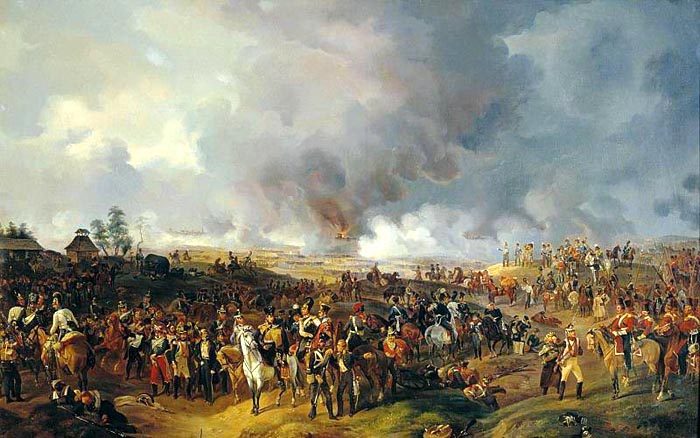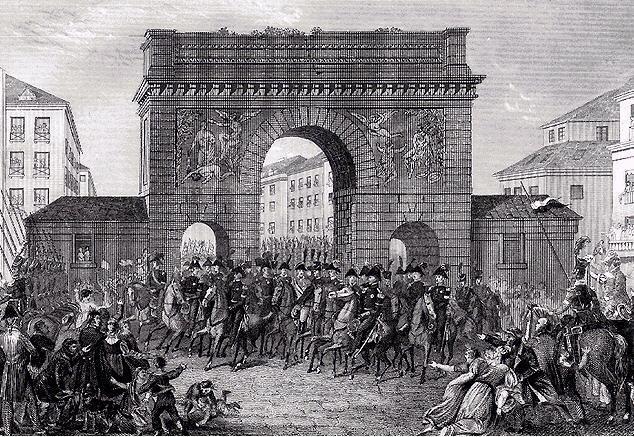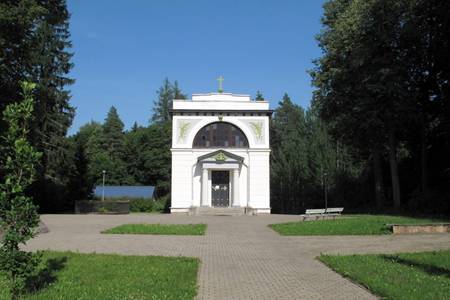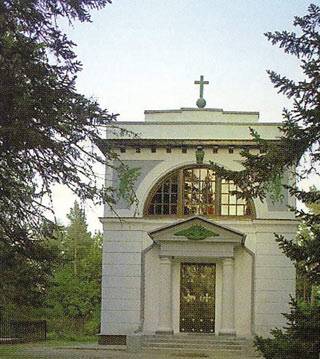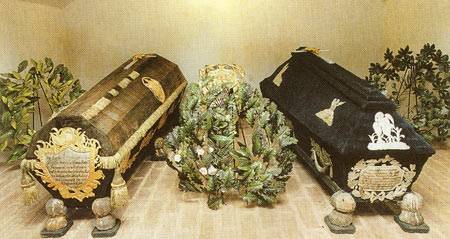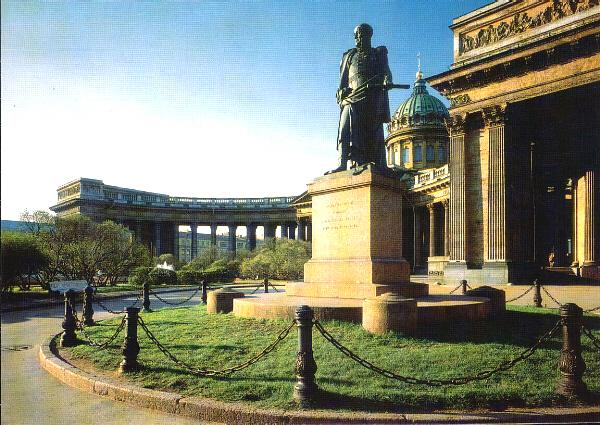Barclay de Tolly
Napoleon flung the bigger part of his Cavalry on Raevsky's grenadiers, but the grenadiers formed in square had stopped the French. Barclay tried to help Raevsky and sent the Light Horse troops to him, but the these troops were crushed by the French Cavalry before they would be able to deploy. Then the Old Guards of Napoleon rushed to the attack, Barclay set against them the Heavy Cavalry and the Russian and Prussian Guards. The onslaught of the French weakened but the Allies couldn't achieve the decisive results.
The next day the battle renewed. The main attack of Barclay's troops were against the French Corpss of Victor and Loriston that stayed at Probetgate village. The combat lasted almost all the day but Barclay's troops couldn't seize this fortificated village.
At night on October , 7 Napoleon retreated to Leipzig and began to prepare to leave the city. In the morning the Allies began the assault of Leipzig but Barclay's troops didn't take part in it.
|
|
In this battle that was called "The Battle of Nations" Napoleon's losses were over 60 thousand of killed and wounded, 20 thousand of taken prisoners and 325 of guns.
For the Leipzig battle Barclay de Tolly was conferred a tittle of a Count.
The Allies began to pursue the French troops. At October,24 Barclay's troops entered into Frankfurt am Main, and at January,1,1814 they crossed the Rhine and entered into Basel.
And here The Allied Forced were reformed again and Barclay became the commander of the part of the Bohemia Army Reserve consisted of Russian, Prussian and Baden Corpss.
In the beginning of February there was a war council in the Allies Main Headquarters and Barclay declared for continuation of pursuit of the enemy and the main part of generals agreed with him. But when Alexander I suggested to go to Paris, all questions no longer arised.
|
|
At March,19 in the morning the Allied Forces entered into Paris. And that day Barclay de Tolly was given a rank of General-Field-Marshal.
On April,2 he gave his post to Tsesarevixh Konstantin and took the command of the Silesian Army replaced Blucher on this post. Also those days he got the highets war award from his former enemy that was now his ally, the Swedish Order of the Sword of the 1-st Class.
In May Field-Marshal Barclay accompanied Alexander I in his trip to England. In summer of 1814 he became again the Commander-in-Chief of the 1-st Army consisted of six infantry Сorps The Headquarters of this Army was located in Warsaw.
| 1815 And The Last Years |
Barclay was in Warsaw when Napoleon returned to France from Elba island in February, 1815.
In April, 1815 Barclay's Army (225 thousand men) took the field and went to France. When the Army had passed Galicia, Bohemia and Germany they received a message about the Waterloo battle and the victory of English-Prussian troops.
Using his rich military experience Barclay published "The Rules of Loose Order Or Manual About Scattered Actions Of Infantry For Chasseur Regiments". Afterwards these rules were widely used in the Russian Army.
In the beginning of the next year Barclay came to St.Petersburg and asked Alexander I for resignation for reasons of health or to give him a leave for treatment of his disease - the arthritis.
The Emperor gave him a leave for two years and granted one hundred of thousands roubles to him for the treatment on "the waters" in Chech. In the end of April Barclay's family left Beckhof.
After a short rest in his new estate in Solben (60 versts far from Riga) they continued the trip. But day by day the Field-Marshal felf himself worse, the pains in his chest became stronger. This made them to stop in Memel, Riga and Tilzit. On May, 13 just near Instenburg (modern Chernyakhovsk) Barclay's doctor insisted to stop in Shtilitzen.
That day Michail Bogdanovich Barclay de Tolly died.
The first who learnt about his death was Prussian King Frederick-William III. He ordered at once to send a Guard of Honour to Shtilitzen, and escorted by it the coffin with the body of the Field-Marshal was conveyed to the Russian border.
| The Tomb of Barclay de Tolly. |
The tomb of Barclay de Tolly is in the village Yigeveste not far from the town Viljandi, Estonia.
This village was the estate of his wife Helen, in XIX century it was called Beckhof.
Now there is a mausoleum of Barclay de Tolly in this village. It was built in 1823 and remains to our days.
You can see it on the photos.
|
|
|
|
|
|
Now mausoleum is a museum, in it you can see the tomb of Barclay de Tolly and his wife Helen.
The mausoleum survived in very hard combats of WWII because both sides tried not to destroy it: for the Russians he was a national hero and the Germans too counted him as a prominent German person.
So this museum is working now and you can see it in this village, buy the way it's the main place of interest of this part of Estonia.
| Kutuzov and Barclay de Tolly |
There is a lot written about campaigns of 1812,1813 and 1814. But in the main part of sources (especially Western ones) Kutuzov is named the leading figure in Russian army. But we think it is one of the biggest delusions in the whole History of Napoleonic period. And if you has changed a little your opinion after reading this page, we will know all our efforts were not vain.
Kutuzov and Barclay de Tolly. The two principle Generals of the Russian army.
The first, an excellent tactician. In his youth he could make courageous and unusual decisions and was never afraid to take responsibility for them. He was one of the best disciples of Generalissimo Suvorov. But when he was a young officer in the army of Rumiantsev, he was given a strong dose of human meanness and since became reserved, distrustful and buttoned up for the rest of his career.
In the end he came to fear responsibility and always tried to shift off all decisions on somebody else. He became an excellent retinue member who always came out unscathed.
The second, Barclay de Tolly, was always promoted slowly because he often came out openly against his command if he saw that senseless human sacrifices would be made to please the Tsar or to gain an unimportant victory. He was always able to defend and prove his point of view. He was very popular and respected by his officers and men because he saw them as people, not just soulless figures in military reports.
But at court and among the highest general officers he was always a stranger. He could not be proud of his long and rich genealogy as Kutuzov, or as a descendant of Georgian tsars as was Bagration. Nor did he own huge estates and luxurious palaces in both capitals as did many others.
Often he was blamed because his last name sounded very unusual to the Russian ear, although many Germans held different high posts, and such names were not uncommon at all. By the way, he was not German. His ancestors came from Scotland. He carried on his broad shoulders the hardest part of the campaign of 1812. It was he who found the only tactics by which Russia could win this war without huge, senseless losses. Yet he was removed from the post of War Minister and the Commander-in-Chief of the Russian army by Alexander's order.
It should be said in all fairness that this order was the last thing Alexander wanted to sign. He thought highly of Barcaly as a highly skilled general, a wise strategist and a very clever diplomat, but he was forced to do so by pressure of the nobility leaders who feared Napoleon - Not his army, losses and terrible destruction accompanying every war. They were not so afraid of the iron regiments of the Great Army as of the pen of Napoleon, by that he could any time sign an edict to abolish serfdom in the occupied Russian territories. To declare freedom for serfs as he did in other countries of Europe, would be the end of their world. They would prefer any other conqueror, even Attila or Chinhiz-Khan. In their world Napoleon was a stranger forever, as was Alexander, surrounded by his father's murderers and Barclay, surrounded by high-born dignitaries that hated him.
Kutuzov was appointed Commander-in-Chief only days before the Borodino battle. What new did he introduce in the Russian army strategy?
Really nothing. He merely continued and completed the plans of Barclay de Tolly with the only difference that Barclay would never agree to the battle at Borodino that killed so many, as Kutuzov did under pressure of the nobles. That terrible, bloody massacre had almost no results.
Borodino cannot be called a victory of the Russian army, though many of Russian sources try to prove the impossible. And Kutuzov himself tried to make many people believe it was a victory, but of course, such Russian generals as Ermolov, Osterman-Tolstoy and many others knew better.
Kutuzov and Barclay had finally broken off their relationship in the village of Phili just after the War Council where the decision to leave Moscow was made. Kutuzov asked Barclay the same sacramental question: "Have we won at Borodino or not?" And Barclay with his usual straightforwardness replied: "A battle after which an army leaves the field of battle and gives its capital to the enemy cannot be called a victory". After this confrontation, Barclay was forced to leave the army, but soon, after insistent requests of Alexander, he returned again to take command of the army in 1813, and to enter Paris in 1814 at the head of it.
|
|

